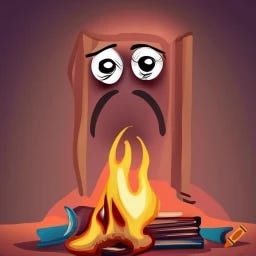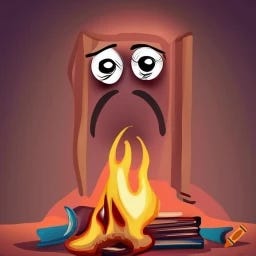Note: This is the second article in my Areo reprint series. These articles were first published in the wonderful but now-defunct magazine Areo. I hope you enjoy them. These versions are typically my original draft versions before the esteemed Iona Italia editing. Thus, any errors are mine alone. This particularly essay was written back in 2021 when cancel-culture had hit a fever pitch. Nonetheless, I think it’s larger points are still relevant today.
The last few weeks have seen recent dustups over the decision by the foundation overseeing Dr. Seuss’ works (i.e., Dr. Seuss Enterprises) to no longer publish 6 books deemed problematic, as well as claims the old Pepe LePew cartoon leads to rape culture. These recent incidents add to what appears to be an increasing effort to restrict the availability of controversial books, TV shows and other fictional media, as well as social media. These come mostly from non-governmental producers and distributors of such content, often in the context of social media moral outrage campaigns. Do these steps amount to censorships or bannings?
This question has caused considerable debate and confusion and, of course, it helps to understand what we mean by censorship. It is not uncommon to see people claim that, for instance, Target banning sales of Abigail Shrier’s book Irreversible Damage or the Seuss foundation’s decision to no longer sell 6 of his books are basically “fine” because these decisions were made by private entities, not by government. Also, we are assured, these decisions don’t really amount to censorship because the materials are still available if people really wish to find them.
These arguments limit censorship to what I refer to as de jure censorship or censorship coming from the law. The First Amendment of the US Constitution is designed to limit de jure censorship, preventing the government from introducing in speech, protest, religious expression or the production of news, art, fiction, etc. From the social science side, I have some experience with de jure censorship efforts, particularly regarding efforts to by states and municipalities to restrict the sale of violent video games to minors. The US Supreme Court ruled such efforts unconstitutional and, rightly so, as there was not data to support they would be valuable in reducing youth aggression. There are narrow and largely non-controversial exceptions, ranging from slander and libel through child pornography, but most of the public opposes de jure censorship beyond these.
However, the government is not the only means by which censorship occurs. My interest here, related to these recent culture war battles, is de facto censorship, or censorship that exists in practical reality even if it is not directly enforced by law. I argue that when distributors make material unavailable for sale, they engage in de facto censorship, stepping in as non-governmental regulatory agents to make speech unavailable to those who might otherwise wish to make an informed decision to consume it. I think we can say that if powerful entities, whether publishers, distributors, tech companies, etc., make decisions that remove media from availability for consumption, this is clearly censorship (or bannings, etc.,). The more interesting question is how to balance the rights of media companies to control media versus the public to consume it, particularly when these decisions are made in response to moral advocacy campaigns as opposed to, say, poor sales (one of the arguments against the 6 Dr. Seuss books was that they sold less well than his other books, though I suspect most authors would kill to have the sales figures of any Dr. Seuss book).
The somewhat blithe argument that consumers can access unpublished works easily if they so inclined is a bit facile and perhaps easier to dispense with. The Dr. Seuss escapade put that argument to the torch when eBay soon after moved to stop person-to-person sales of the books on its platform (though they seem to have been returned following criticism). Bannings that follow a moral outcry can potentially create a kind of cascade as platform after platform fall like dominoes. Usually, it takes a public protest in the opposing direction to put a halt to this (as appears to have happened with eBay, as well as Target’s reversal of a decision to ban Abigail Shrier’s book from its website). Absent such a reverse objection, moral advocates almost certainly would follow the chain to get the material pulled from any source available.
Of greater interest is the question of whether distributors and producers have a moral obligation to continue making potentially offensive materials widely available despite the outcry of some portion of the public (often a tiny minority on Twitter). We can stipulate upfront that private entities have the legal right to do whatever they wish (indeed to ask the government to end this would itself be de jure censorship which almost always would be worse). However, I argue in most cases, those who decide to take on the mantle of creating, producing, and distributing media in any form have a moral obligation to resist censorship in all forms, including de facto censorship they themselves may create.
For instance, in the case of the Seuss foundation, rather than halt all publication of the books, the foundation could have divested the books into the public domain, waiving all future copyright. By doing so, they could have clearly stated they wished to have no further relationship with the books, while allowing the books to still be available to any who wished to access them (indeed, they could then be made available for free.) Many highly controversial books, including Mein Kampf exist in this basic state. Alternatively, the foundation could have commissioned new editions of the books with the offending pictures recreated more in line with current standards. Either of these options could have made the clear statement the foundation could no longer stand behind the offending pictures, but without prohibiting people’s access to the books themselves. Then again, as Matt Yglesias has pointed out, the foundation has undoubtedly reaped high profits off the controversy as sales of Dr. Seuss’ other books have soared.
Put simply, media producers and distributors should be expected to adhere to an ethical system supporting the public’s broad access to even controversial books and media. This doesn’t mean these producers shouldn’t be free to disavow these works or put them into public domain. But prohibiting sales is a bad decision and doesn’t work for the common good and should always be discouraged.
Trickier still is whether a creator or author’s wishes to ban their own work should be honored. This is tricky since it pits the creator’s speech rights against the public’s. Neither should be taken lightly. Here, though, my own personal thought still weighs toward the public good surpassing that of the individual creator. Up until a work is released, it doesn’t occupy public space and the creator’s (as well as publisher, distributor, etc.) rights really don’t come into conflict with the public. But once a work is released, that calculus changes. At that juncture, the decision to retract a work has several ramifications. First, the decision may be made for the wrong reason (more on this in a moment). Second, it may incentivize future moral crusades that lead to further bannings other authors didn’t want, the precedent having been made for authors to acquiesce to claims of “harm”. And third, it can cause a chilling effect on further creativity as authors become frightened to produce anything edgy some group or another might oppose.
We can look at a few examples to illustrate these concerns. In the 1990’s Stephen King allowed his novella Rage to fall out of print, concerned it might be linked to actual school shootings. Ultimately, later research would clarify that fictional media, whether books or video games, plays no role in the development of rampage shooters. Put simply, King fell victim to a moral panic and made a mistake. That’s not to say it wasn’t a good-faith mistake, made with the best information available at the time; yet mistake it was. This mistake not only made it difficult to access the book, but also contributed to false beliefs at the time linking fictional media to violence, a belief that risked encouraging de jure censorship on the part of the government. There are other examples of authors who retracted or substantially edited books, or agents dropping authors following morally valenced incidents. Each time this precedent is reinforced, it makes it more difficult for future authors to resist moral crusades.
The other famous example, and an uncomfortable one as it cuts across even my line of suggesting publication as the entrance of works into the public good is that of Franz Kafka. Famously, most of his work was published after his death and against his explicit written instructions to have the material burned. This is a clear case of a writer’s desires being violated, but it’s also hard to disagree that the world isn’t better for that having been the case. As a writer myself (and do buy my novel!) I do believe authors should profit from their works during their lifetimes. They should also be free to disavow their work, should they so choose. But unpublish it? I’m not so sure…just as with science I have the sense that creation in this space owes a certain sacrifice to the public and that, ethically, that may be something creators should make peace with if they go into this area. Should I have the ethical right to unpublish my novel should it become uncomfortable for me in the future. Honestly, I should have the right to publicly disavow it, but not unpublish it.
There are probably a few legislative fixes that may ease things…copyright is extended absurdly beyond the death of the creator in the United States, for instance. Yet we generally can’t rely on de jure fixes to de facto censorship. But that doesn’t mean de facto censorship isn’t a real problem we need to address as a culture. Quite the contrary…I suspect as produces and distributors including big tech companies increasingly become monopolies, de facto censorship by private entities will become one of the bigger cultural challenges of the 21st century.




